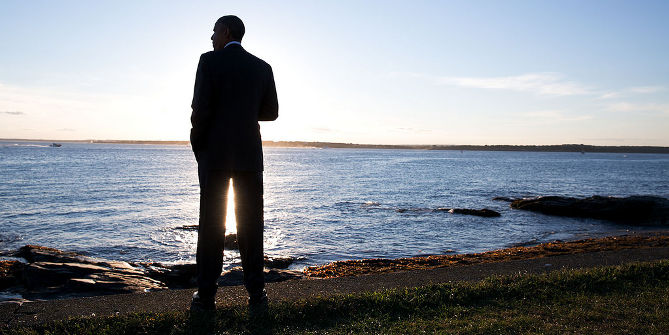 Earlier this month Donald Trump stunned much of America and the world by winning the 2016 presidential election. But how can we explain his election win and what are the implications of a Trump presidency? LSE US Centre Director, Peter Trubowitz, writes that key to Trump’s relatively small victory margin were his gains among white rural voters. He argues that as president, Trump will have more room to rewrite US foreign policy than many have thought, and that he may significantly reduce America’s international role as a response to past policies of internationalism that his voters have seen few benefits from.
Earlier this month Donald Trump stunned much of America and the world by winning the 2016 presidential election. But how can we explain his election win and what are the implications of a Trump presidency? LSE US Centre Director, Peter Trubowitz, writes that key to Trump’s relatively small victory margin were his gains among white rural voters. He argues that as president, Trump will have more room to rewrite US foreign policy than many have thought, and that he may significantly reduce America’s international role as a response to past policies of internationalism that his voters have seen few benefits from.
What explains Trump’s victory?
Many things contributed to Trump’s unexpected victory on November 8th: a politically vulnerable opponent, low voter turnout and voter suppression in key battleground states, FBI Director Comey’s decision to reopen the federal investigation into Clinton’s emails, among other things. But at the end of the day, the single biggest factor was Trump’s ability to recognise and tap a well of popular anger and resentment that others missed. Trump’s whole campaign was predicated on the assumption that there was a “missing white voter” — a large group of non-college educated voters who had been sitting out presidential contests and would vote Republican if they were offered policies that spoke to their grievances about Washington, globalism, and multiculturalism. That theory was put to the test November 8, and it held up.
Exit polls show that white voters backed Trump 59 to 39 percent. But it was among the non-college educated blue collar voter (historically Democratic) that Trump’s strength proved decisive. He won that group 67 to 28 percent. This is what allowed him to capture pivotal Democratic states like Pennsylvania, Wisconsin and Michigan. African-American and Latino voters voted overwhelmingly for Clinton, but the numbers were well off Obama’s share in 2012 and were not enough to compensate for Trump’s strength among white voters. Indeed, despite Trump’s inflammatory rhetoric about Mexican-Americans, he won 29 percent of the Latino vote. Sixty percent of millennials backed Clinton, but that is 5 percent less than backed Obama four years ago. In the end, Trump’s gains among white voters, especially in rural America, were just too much for Clinton to overcome with votes from Democratic Party strongholds in the big urban parts of the country.
As impressive as Trump’s win is, his margin of victory was narrow. He lost the popular vote by more than 2 million votes, or 1.5 percent of all votes cast. By comparison, George W. Bush lost the popular vote to Al Gore by roughly 540,000 votes (or 0.5 percent of votes cast). Moreover, in a number of key states, a one-percent shift in the vote would have put Clinton in the White House. Meanwhile, Trump’s base of support in the electorate rests on an uneasy alignment of white voters that cuts across class lines. Many of the blue-collar voters he picked up in the Rustbelt are really Democrats without the identity politics. They favour entitlement spending (e.g. Medicare, Social Security) and oppose free trade packages like NAFTA and TPP. Others are conservative Republicans who want to cut taxes, promote free trade, and reduce social spending. Trump’s political fortunes will depend on how well he manages such differences within his electoral coalition. This brings us to the next question.
How will Trump govern?
This is the sixty-four-thousand-dollar question. Will Trump throw his supporters under the bus and align with House Speaker Paul Ryan and other conservative Republicans? Or will he adopt a divide-and-rule strategy, combining planks that appeal to core Democratic constituencies (e.g. infrastructure spending, trade restrictions) and to core Republican constituencies (e.g. tax cuts, deportation)? The biggest “known unknown” is where Trump comes down on entitlements. If Trump backs efforts by conservative Republicans to aggressively roll back entitlements, he risks a popular backlash that will give Democrats a potent issue. If he does not make concessions to the Ryan Republicans and instead protects entitlements, then Trump could well face obstruction within his own party over what is likely to be his signature domestic policy initiative – infrastructure spending.
Trump’s victory also raises questions about whether he will make good on his call for America to redefine its interests abroad. Here I think he has a good deal more political running room to rewrite the foreign policy play-book than many political observers think. This is not because Americans want to shut the world out, or because they do not care about international matters. It is because internationalism is losing ground domestically. For over thirty years, Washington’s political class has been dismantling the social contract over wages, benefits, and education that made internationalist policies (free trade, open immigration, and forward defense) acceptable to ordinary working Americans. The domestic foundations of US foreign policy have been gradually hollowed out by neoliberal policies. As this has happened, support for liberal internationalism has weakened. This year, the bottom fell out.
Globalization’s failure to deliver on its economic promise for average Americans is one important reason that Trump (and for that matter, Bernie Sanders) was able to get so much political traction in the rustbelt states of the Midwest. Trump’s attacks on liberal internationalism appealed to voters convinced that Washington does not have their best interests at heart. It is easy to see why many of them wondered why their leaders are not insisting that wealthy democracies like Japan and Germany put a larger share of their income toward collective defense, or why Congress has not acted to protect the millions of factory jobs that have been outsourced to China and other emerging economies.
Main Street’s view that liberal internationalism is no longer delivering economically is reinforced by a deepening sense that it is no longer needed geopolitically. At a time when America does not face a peer competitor, the strategic risks in “doing less” internationally seem relatively low and manageable to most Americans. The significance of this point should not be underestimated. It helps explain why Barack Obama could tell David Remnick of the New Yorker in 2013, “I don’t really even need a George Kennan right now” and why Donald Trump could voice doubts about the inviolability of NATO’s Article 5. These views might not play well in Mitteleuropa or East Asia, but they make sense in America’s heartland.
Whither the West?
This last point warrants sustained discussion, I think. Western IR scholars and analysts have spent far too much time focusing on the challenges that China, Russia and the Rest pose to the liberal international order and not enough attention on the implications of the rise of illiberalism in the West’s own backyard. As I have argued elsewhere, while rising nationalism, widening inequality, and declining trust are hollowing out liberalism at home, these same forces are raising the political costs of working together to check illiberalism abroad. Across the West, old domestic bargains and understandings are unravelling. Mainstream parties that have formed the backbone of the Western liberal order are fending off challenges from both the left and right to an extent that few would have imagined even a decade ago.
Trump’s victory is certain to fuel the growing domestic backlash within the West against globalization. It will also exacerbate concerns in Europe and Asia about the credibility of America’s security commitments. The question I think is less whether Trump will make good on this threat or that threat. The question America’s allies will be asking (and already are) is whether they should be cutting their own deals with the most powerful countries in their respective regions – with China in East Asia, Russia in Europe, and Iran in the Middle East – or alternatively, taking more responsibility for their own security. Meanwhile, Beijing and Moscow will be looking to see whether Trump’s victory means that Washington will be willing to concede ground internationally in return for concessions on other issues.
Trump may or may not make good on his plans to rethink longstanding strategic arrangements in the West. Yet the mere fact that Trump is in the White House will give friend and foe alike reason to rethink their options. For those who see America’s vast array of overseas commitments as overbearing and risky, this will be welcome news. For those who worry about the potential downside risks of a smaller American geopolitical footprint (e.g., regional instability, nuclear proliferation), there is cause for genuine concern. There is some irony in this. It was only a little over a decade ago that America’s closest allies worried about the risks of being too closely aligned to a hyperactive United States. In the next four years, we are likely to hear less about the risks of grand US designs and more likely to hear about the risks of American abandonment.
This article is an updated version of a piece originally posted on November 11th.
Featured image credit: Gage Skidmore (Flickr, CC-BY-SA-2.0)
Please read our comments policy before commenting
Note: This article gives the views of the author, and not the position of USAPP– American Politics and Policy, nor of the London School of Economics.
Shortened URL for this post: http://bit.ly/2gOxhzg
______________________
About the author
 Peter Trubowitz – LSE US Centre
Peter Trubowitz – LSE US Centre
Peter Trubowitz is Professor and Head of International Relations, and Director of the LSE’s US Centre. His main research interests are in the fields of international security and comparative foreign policy, with special focus on American grand strategy and foreign policy. He also writes and comments frequently on US party politics and elections and how they shape and are shaped by America’s changing place in the world.







2 Comments